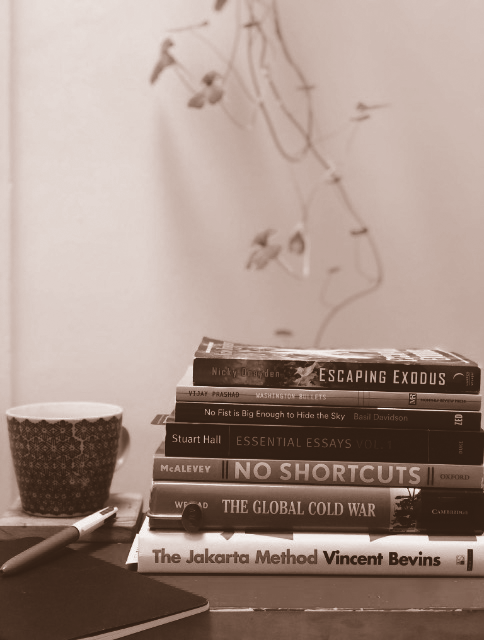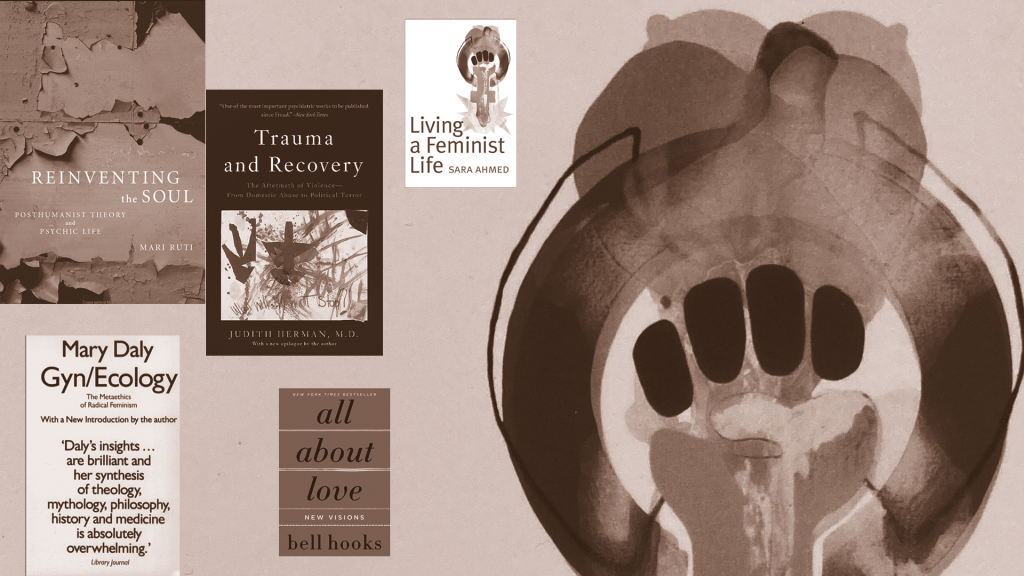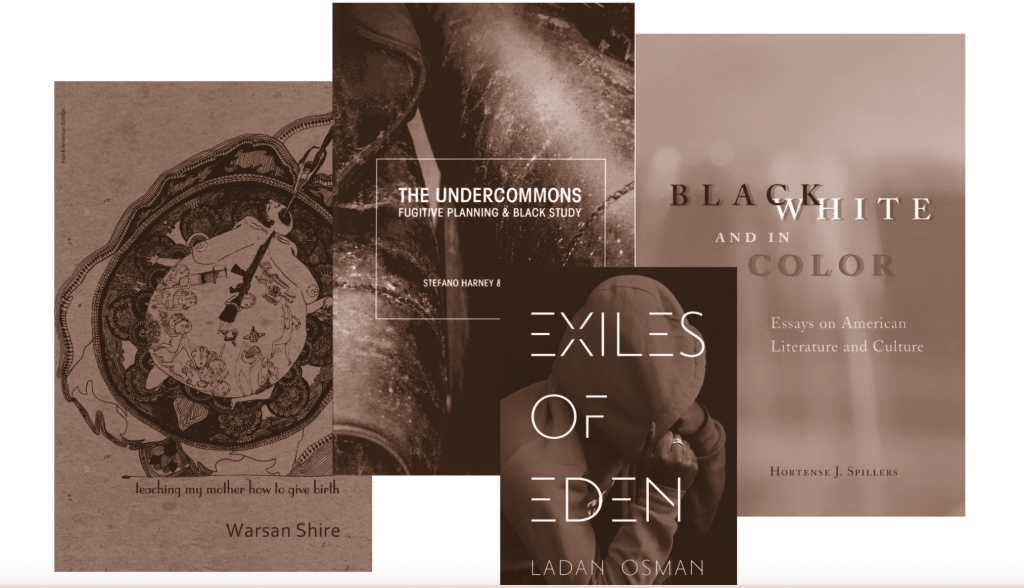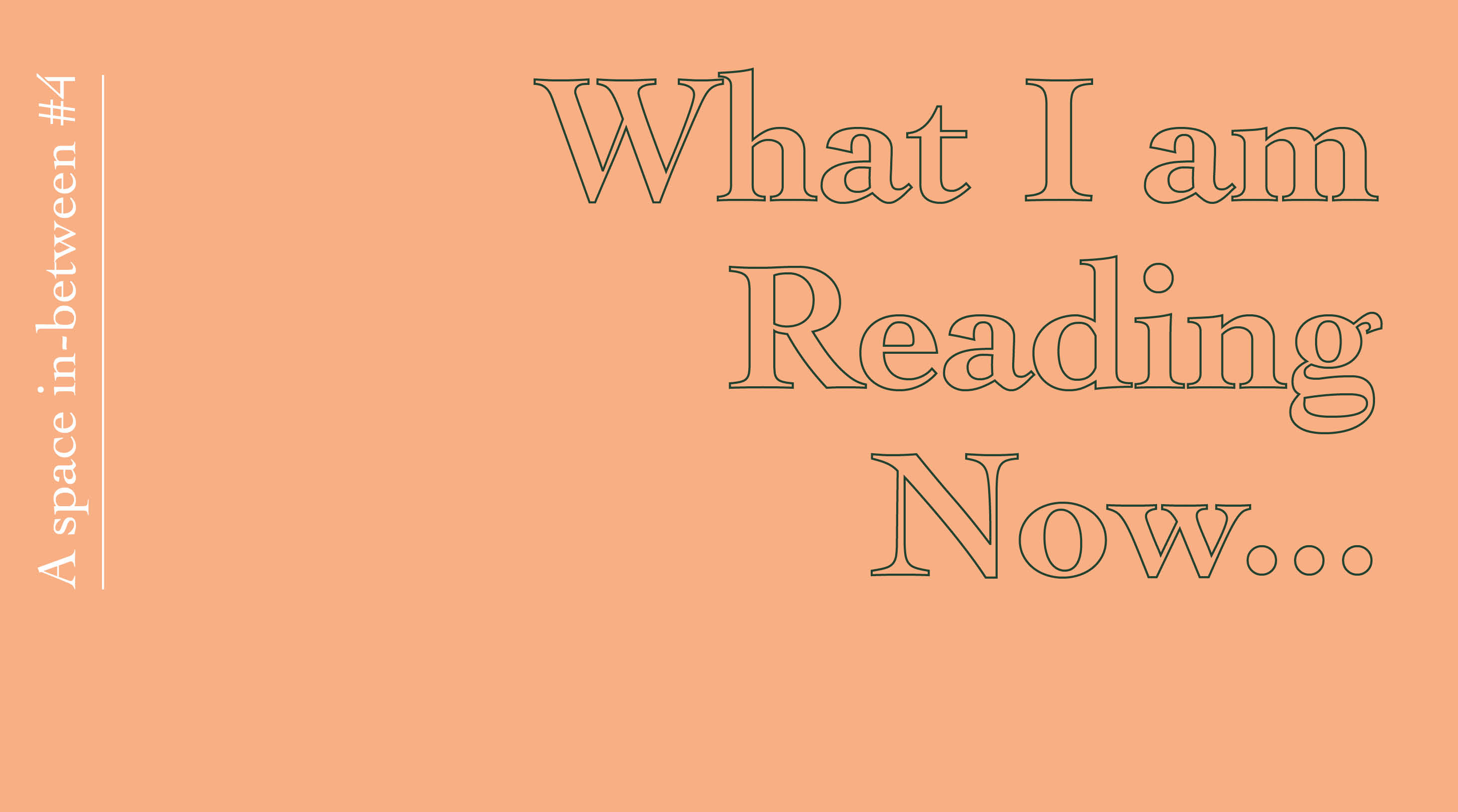What I am Reading Now… is the online iteration of a printed column, of the same name in Cooper Gallery’s occasional periodical &labels.
This ongoing online iteration of What I am Reading Now… is influenced by the global political movement Black Lives Matter and invites Black practitioners and practitioners of colour to share, with a preface, a selection of five readings that are shaping their current thinking, research and practice.
What I am Reading Now…
Joshua Virasami
December 2021
I’m a serial non book finisher, in fact one of the lyrics off my old album is ‘six books by my bedside, but only half of them read’, so the disclaimer here is that some (definitely less than half) of these are unfinished. That said, this set of books have been hugely influential to me in past months, in helping make sense of the world around me, and the world within me.
There’s a temptation to treat an introduction like this almost as a journal of how these books have helped me navigate the world on a day to day, or week to week basis, but I won’t. What I’ll say is that these past weeks and months have taught me a lot about the power of mass culture, as a reactionary place, but also a place of challenge and of new possibility. A place where we are interpellated in a complicated way, but where we can navigate, decode, subvert and fundamentally challenge capitalism and its many twin evils.
In the past months I have been both one of the programmers for the World Transformed Festival, and a collaborator with a good friend and educator on the editing of a social justice curriculum for a well established museum in London, both roles have created space for thinking about culture, power, politics and representation – so it feels apt to be introducing some of the books that have acted as maps in this journey.
In navigating with an ear to the force of liberalism, neo-liberalism and enduring imperialism in today’s world Domenico Losurdo’s Liberalism: A Counter History, Vijay Prashad’s Washington Bullets, Vincent Bevin’s The Jakarta Method, and Odd Arne Westad’s The Global Cold War have been incredibly useful.
In navigating with an eye to strategy, power and political organising both Jane McAlevey’s No Shortcuts and Basil Davidson’s No Fist is Big Enough to Hide the Sky have been grounding materials.
In thinking carefully through culture, society and much more, I’ve returned to Stuart Hall, initially his key-note lecture ‘Race, the floating signifier’, and then in his introduction to the book Cultural Identity, titled Who Needs ‘Identity’? And his essays reflecting on Cultural Studies in Essential Essays Vol. 1.
Finally, in a long awaited return to fiction, I’ve had my imaginative muscles massaged through Nicky Drayden’s Escaping Exodus, an incredible sci-fi book which provokes so many questions of societal collapse, love and spiritual transcendence.
Joshua Virasami is an artist and political organiser, he is a member of climate justice collective Wretched of the Earth and anti-racist organisation Black Lives Matter UK. As an activist and organiser he has been involved in a number of movements and campaigns, including the Occupy movement.
As a writer he has written for various outlets including Guardian, Independent and Novara Media, and has published How to Change it: Make a Difference with #Merky Books. As a facilitator and educator he works with collective Resist and Renew, and independently with various cultural initiatives and grassroots groups. In his day job he works on a five year programme exploring a Just food and climate transition in the borough of Tower Hamlets, bringing together community groups, local authorities and housing providers to experiments in local, sustainable food production, distribution and waste.
Liberalism: A Counter History, Domenico Losurdo (Verso, 2014)
Washington Bullets, Vijay Prashad (Monthly Review Press, 2020)
The Jakarta Method, Vincent Bevin (Public Affairs, 2020)
The Global Cold War, Odd Arne Westad (Cambridge University Press, 2011)
No Shortcuts, Jane McAlevey (Oxford University Press, 2018)
No Fist is Big Enough to Hide the Sky, Basil Davidson (Zed Books, 2017)
Race, the floating signifier, Stuart Hall (Keynote lecture, Goldsmiths College, 1997)
Questions of Cultural Identity, Stuart Hall and Paul du Gay (SAGE Publications Ltd, 1996)
Escaping Exodus, Nicky Drayden (Harper Voyager, 2019)

What I am Reading Now…
Yayra Sumah
November 2021
How to be Born Again
When I first read Mari Ruti’s Reinventing the Soul: Posthumanist Theory and Psychic Life (2006), I identified with the ‘we’ of her prosaic arguments. In her book, Ruti looks for the affirmative potentials of post-humanist thought or critical theory. She asks, what are the possibilities for agency and healing, given that the psyche is formed within the socio-symbolic and disciplinary networks of power? How do we reinvent the ‘soul’ without perpetuating “the humanist ideals of core subjectivity and autonomous self-constitution?”
This ‘autonomous’ self descends from the philosophical traditions of colonizers: Western scholasticism, humanism and the Enlightenment. But implicit in the ‘we’ of critical theory’s quest to deconstruct this subject is a culturally specific understanding of the psyche. Returning recently to Ruti’s text, I felt the need to reconsider critical theory. As a black African woman practicing ancestral spirituality, I find healing agency and rebirth in the customs, knowledge and psychic powers of my ancestors. I root in an ontology and epistemology which does not share the same questions, concerns or insights as Western post-humanism. The texts I am sharing here have guided my self-actualization process, but I believe there are no common sets of texts. Healing is led by one’s ancestors and spirits.
In the theory and practice of creating a liberatory subjectivity in a world of repression and oppression, there must be discrimination and separation in that ‘we’. I realised this when I received a rude awakening during a program I co-convened called #Healing, hosted by Haus der Kulturen der Welt. There, I witnessed the dynamics of racist, neocolonial thieves of culture who claimed to ‘learn’ from others about how to be ‘otherwise’, but violated boundaries and prohibitions to extract anything they could by denying cultural difference. No decolonization is collective or real if the ‘we’ of cultural boundaries is disrespected.
Yayra Sumah is a doctoral candidate in the department of Middle Eastern, South Asian and African Studies at Columbia University. She holds bachelors and Masters Degrees in Political Science with a minor in African Studies from Boston University, magna cum laude. She is an interdisciplinary scholar with a research focus on the history of colonialism in Congo (DRC), Kimbanguism, African Christianity and Central African spirituality. Her dissertation brings together history, anthropology, religion, philosophy and political theory in an original interpretation of Simon Kimbangu’s movement in Belgian Congo. It considers the stakes of the meaning of Kimbangu for the postcolonial African debate on what it means to be ‘decolonized’ and ‘African’. Her interests also include poetry, art, activism and cultural criticism. She has written for Borderlines (Journal of the Comparative Studies of South Asia, Africa and the Middle East), Paletten Art Journal, and SUNU: Journal of African Affairs, Critical Thought + Aesthetics.
All about love: New Visions, bell hooks (Harper, 2001)
Trauma and Recovery: The Aftermath of Violence – From Domestic abuse to Political Terror, Judith Herman (Basic Books, 1992)
Gynecology: The Metaethics of Radical Feminism, Mary Daly (Beacon Press, 1990)
Reinventing the Soul: Posthumanist Theory and Psychic Life, Mari Ruti (Other Press, 2006)
Living a Feminist Life, Sara Ahmed (Duke University Press, 2017)

What I am Reading Now…
Serubiri Moses
October 2021
I tend to read and re-read certain texts as their meaning shifts and collates over time, as I look at them again and again. This is similar to looking at photographs, which I believe one has to look at again and again and again to arrive at any sustained kind of seeing. What does it mean to see or what does it mean to listen? These are questions that preoccupy me while I go about my reading. I have taught, in the course of last year, as an adjunct assistant professor in the Art and Art History department at Hunter College on 68th street, Manhattan, New York. And have of course transitioned to zoom, with everyone. My reading is often (but not always) guided by the syllabi I have organised to teach. I wanted to share the texts that have accompanied me through rough and unstable times, such as the ones we have all seen recently. Two Somali poets (one British and the other American) have been constantly coming back to me.
I have read and re-read the poem ‘Refusing Eurydice’ by Ladan Osman. It is published in Osman’s poetry collection called Exiles of Eden (2019). Even before I properly knew the story of Eurydice as it is written in the Greek texts, I was moved tremendously by these lines by Osman: “We refuse death by discourse. / We refuse death by exile. / We refuse death by falling, / and we refuse death in depressions.” The other poem that I have read and reread is ‘Trying to Swim with God’ by Warsan Shire included in the poetry collection Teaching My Mother How to Give Birth (2011). It includes these words, “My mother says no one can fight it / the body returning to God.”
In my courses, I have taught work that tends to be beyond the remit of art history. This includes two of Prof. Hortense Spillers’s powerful essays: one titled, ‘Formalism Comes to Harlem’, included in her essay collection Black, White, and in Color: Essays on American Literature and Culture (2003). In the essay, Prof. Spillers writes that: “I would prefer to begin to talk about Afro-American literature in the following terms: Intent on producing works of filiation, advocacy, preservation, convocation (a literature whose principal movement is informed by an external narrative), black American writers tend to rehearse a metaphorical valuation of human apprenticeship.” She writes this stunning passage in response to black American novelist Toni Morrison’s critics. This thematic of apprenticeship appears again in the other essay by Prof. Spillers that I teach in my courses. The Idea of Black Culture (CR: The New Centennial Review, Vol 6, No. 3, Winter 2006, pp 7-28) which also appears as a lecture (available on YouTube). In it, she engages two powerful thinkers: Herbert Marcuse and W. E. B. Du Bois. Following both thinkers and their writings on culture, she refers to “the intramural disposition of specific cultural projects” and wrestles with the fact that “black culture could, by virtue of the very act of discrimination, become culture, insofar as, historically speaking, it was forced to turn its resources of spirit toward negation and critique.”
Finally, this summer I have been re-reading and re-considering Fred Moten and Stefano Harney’s book, Undercommons: Fugitive Planning and Black Study (2013) as I have been teaching a five-week course at the independent art school, Dark Study. My students and I have been trying to understand what it means to abandon the academy, or the university, perhaps in a way that recalls philosopher Gayatri Spivak’s concept of ‘affirmative sabotage.’ We have often lingered and revisited the quote, “The student does not intend to pay.”
Serubiri Moses is an independent writer and curator, who has been appointed part-time faculty at the Center for Curatorial Studies, Bard College, and recently served as adjunct assistant professor in the Art and Art History Department at Hunter College. He is co-curator of MoMA PS1’s survey of contemporary art, Greater New York, and previously was on the curatorial team of the 10th Berlin Biennale of Contemporary Art. His current research focus is on theories of Black and African art. Recent publications and conference talks include: ‘Violent Dreaming’. e-flux journal. 107. March 2020; ‘Death as a Premonitory Sign’. Singapore Art Biennial Symposium. February 2020. Moses lives and works in New York City.
Exiles of Eden, Ladan Osman (Coffee House Press, 2019)
Teaching My Mother How to Give Birth, Warsan Shire (Flipped Eye Publishing Limited, 2011)
Black, White, and in Color: Essays on American Literature and Culture, Hortense J. Spillers (University of Chicago Press, 2003)
The Idea of Black Culture, Hortense J. Spillers (CR: The New Centennial Review, Vol 6, No. 3, Winter 2006, pp 7-28)
Undercommons: Fugitive Planning and Black Study, Fred Moten and Stefano Harney (Minor Compositions, 2013)

